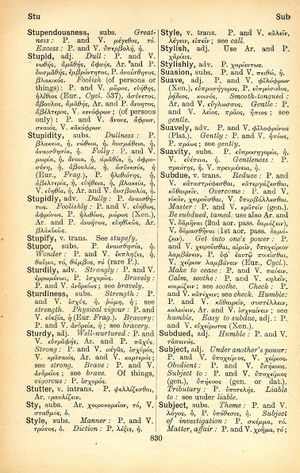subject
καλῶς γέ μου τὸν υἱὸν ὦ Στιλβωνίδη εὑρὼν ἀπιόντ' ἀπὸ γυμνασίου λελουμένον οὐκ ἔκυσας, οὐ προσεῖπας, οὐ προσηγάγου, οὐκ ὠρχιπέδισας, ὢν ἐμοὶ πατρικὸς φίλος → Ah! Is this well done, Stilbonides? You met my son coming from the bath after the gymnasium and you neither spoke to him, nor kissed him, nor took him with you, nor ever once felt his balls. Would anyone call you an old friend of mine?
English > Greek (Woodhouse)
adjective
under another's power: P. and V. ὑποχείριος, V. χείριος.
subject to: P. and V. ὑποχείριος (gen.), ὑπήκοος (gen. or dat.).
substantive
theme: P. and V. λόγος, ὁ, P. ὑπόθεσις, ἡ.
subject of investigation: P. σκέμμα, τό.
matter, affair: P. and V. χρῆμα, τό; see matter.
as opposed to predicate: τὸ ὑποκείμενον (Aristotle).
providing posterity with subjects for song: V. ἀοιδὰς δόντες ὑστέροις βροτῶν (Eur., Troades 1245, cf. Eur., Supplices 1225).
be a subject of dispute, v.; P. ἀμφισβητεῖσθαι.
nothing to do with the subject: P. οὐδὲν πρὸς λόγον, ἔξω τοῦ πράγματος.
subject to your approval: P. and V. εἰ σοὶ δοκεῖ.
subjects, those governed: P. and V. οἱ ὑπήκοοι, P. οἱ ἀρχόμενοι.
be subjects, v.: P. and V. ἄρχεσθαι.
be subjects of: Ar. and P. ὑπακούειν (absol. or with dat. or gen.).
verb transitive
bring into subjection: P. and V. καταστρέφεσθαι, κατεργάζεσθαι; see reduce, enslave.
expose: P. and V. ὑποβάλλειν (τινά τινι); see expose.
be subjected to malicious accusations: use Ar. and P. συκοφαντεῖσθαι.

